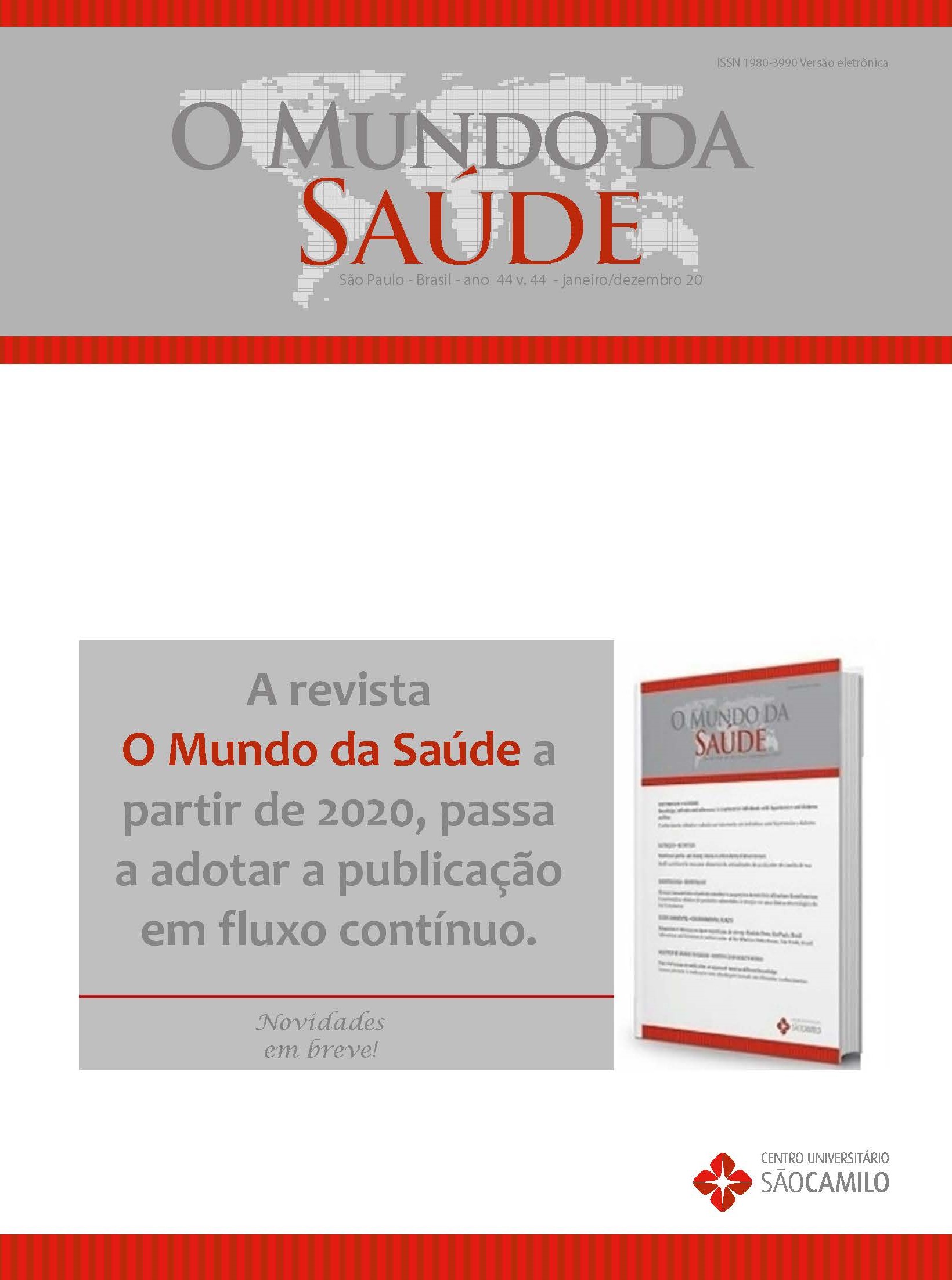Percepção e práticas de cuidadores de lares de infância e juventude sobre saúde bucal no município de Belém, Brasil
DOI:
https://doi.org/10.15343/0104-7809.202044144151Palavras-chave:
Saúde bucal, Educação em saúde, Cuidadores, AbrigosResumo
Crianças não inseridas dentro de uma organização social familiar merecem atenção especial quanto ao cuidado
com a saúde bucal. Investigar noções de cuidado e práticas de higiene de cuidadores torna-se imprescindível para a
compreensão da qualidade da assistência caritativa prestada em abrigos. Assim, este estudo avaliou conhecimentos
e práticas em saúde bucal dos cuidadores de abrigos a partir da escolaridade e realização de atividades em saúde
bucal. A amostra foi composta por cuidadores vinculados às quatro únicas instituições públicas de apoio social a
crianças e adolescentes da cidade de Belém, PA, Brasil. Os dados foram coletados por meio de um questionário
contemplando noções básicas de saúde bucal e cuidados odontológicos, e submetidos a análise estatística por meio
do teste do Qui-quadrado e exato de Fisher, adotando α=0.05. Os resultados indicaram associação entre as variáveis
“instrução prévia de técnicas de escovação” e “promoção de saúde bucal” (p= 0.011), demostrando maior frequência
de orientação de escovação entre os cuidadores que já haviam recebido instruções sobre tais técnicas e entre as
variáveis “grau de escolaridade” e “desenvolvimento de atividades de saúde bucal” (p= 0.0461), revelando que o
acesso ao curso superior implicou em maior promoção de atividades de saúde bucal. Portanto, foi possível verificar
que conhecimentos, atitudes e práticas dos cuidadores em relação à saúde oral se correlacionam, sendo a posse de
conhecimentos e atitudes educativas indicadores favoráveis a práticas de promoção de saúde.
Downloads
Referências
of orphanages in jodhpur city rajasthan, India. J. Clin. Diagn. Res. 2014; 8(10):22-5.
2. Ojahanon PI, Akionbare O, Umoh AO. The oral hygiene status of institution dwelling orphans in Benin City, Nigeria. Niger. J. Clin.
Pract. 2013; 16(1):41-4.
3. Markeviciute G, Narbutaite J. Effectiveness of a motivation and practical skills development methods on the oral hygiene of orphans
children in Kaunas, Lithuania. J. Oral Maxillofac. Res. 2015; 6(3):e2. doi: 10.5037/jomr.2015.6302.
4. Muralidharan D, Fareed N, Shanthi M. Comprehensive dental health care program at na orphanage in Nellore district of Andhra
Pradesh. Indian J. Dent. Res. 2012; 23(2):171-5.
5. Nourijelyani K, Yekaninejad MS, Eshraghian MR, Mohammad K, Rahimi Foroushani A, Pakpour A. The influence of mothers’ lifestyle
and health behavior on their children: an exploration for oral health. Iran. Red. Crescent. Med. J. 2014; 16(2):e16051.
6. Magalhães CMC, Costa LN, Cavalcante LIC. The perception of shelter care educators: their work and the institutionalized child. Rev.
Bras. Crescimento Desenvolvimento Hum. 2011; 21(3):818-831.
7. Saied-Moallemi Z, Virtanen JI, Ghofranipour F, Murtomaa H. Influence of mothers’ oral health knowledge and attitudes on their
children’s dental health. Eur. Arch. Paediatr. Dent. 2008; 9(2):79-83.
8. Almas K, Al-Malik TM, Al-Shehri MA, Skaug N. The knowledge and practices of oral hygiene methods and attendance pattern among
school teachers in Riyadh, Saudi Arabia. Saudi. Med. J. 2003; 24(10):1087-91.
9. Lawal FB, Bankole OO. Oral health awareness and practices of primary school teachers in Inbadan, Nigeria. J. West. Afr. Coll. Surg.
2014; 4(2):47-65.
10. Khare V, Koshy A, Rani P, Srilatha S, Kapse SC, Agrawal A. Prevalence of dental caries and treatment needs among the orphan
children and adolescents of Udaipur district, Rajasthan, India. J. Contemp. Dent. Pract. 2012; 13(2):182-7.
11. Srinivas R, Srinivas P, Viswanath V, Suresh S, Devaki T, Narayana V. Oral health status of institutionalized street children aged 5–15
years In Guntur City, Andhra Pradesh, India. International Journal of Scientific & Technology Research 2012; 1(11):19-23.
12. Pinheiro HHC, Cardoso DG, Araújo MVA, Araújo IC. Knowledge level evaluation about oral health of Sorena Day-Care Center’s
teachers, Belém, Pará. Rev. Inst. Ciên. Saúde 2005; 23(4):297-303.
13. Goel R, Vedi A, Veeresha KL, Sogi GM, Gambhir RS. Oral hygiene practices and dental caries prevalence among 12 & 15 years
school children in Ambala, Haryana -A cross-sectional study. J. Clin. Exp. Dent. 2015; 7(3):374-9.
14. Ferreira-Nóbilo Nde P, Tabchoury CP, Sousa Mda L, Cury JA. Knowledge of dental caries and salivary factors related to the disease:
influence of the teaching-learning process. Braz. Oral Res. 2015; 1(29):1-7.
15. Fernández MR, Goettems ML, Ardenghi TM, Demarco FF, Correa MB. The role of school social environment on dental caries
experience in 8- to 12-year-old brazilian children: a multilevel analysis. Caries Res. 2015; 49(5):548-56.
16. Vinay S, Naveen N, Naganandini N. Feeding and oral hygiene habits of children attending daycare centres in Bangalore and their
caretakers oral health knowledge, attitude and practices. Indian J. Dent. Res. 2011; 22(4):561-6.
17. Damle SG, Patil A, Jain S, Damle D, Chopal N. Effectiveness of supervised toothbrushing and oral health education in improving
oral hygiene status and practices of urban and rural school children: A comparative study. J. Int. Soc. Prev. Community Dent. 2014;
4(3):175-81.
18. Dale JW. Toothbrushing frequency and its relationship to dental caries and periodontal disease. Aust. Dent. J. 1969; 14(2):120-3.
19. Saxer UP, Yankell SL. 1997. Impact of improved toothbrushes on dental diseases. I. Quintessence Int. 1997; 28(8):513-25.
20. Vichayanrat T, Steckler A, Tanasugarn C, Lexomboon D. 2012. The evaluation of a multi-level oral health intervention to improve
oral health practices among caregivers of preschool children. Southeast Asian J. Trop. Med. Public Health. 2012; 43(2):526-39.
21. D’Cruz AM, Aradhya S. Impact of oral health education on oral hygiene knowledge, practices, plaque control and gingival health of
13- to 15-year-old school children in Bangalore city. Int. J. Dent. Hyg. 2013; 11(2):126-33.
22. Mohamadkhah F, Amin Shokravi F, Karimy M, Faghihzadeh S. Effects of lecturing on selfcare oral health behaviors of elementary
students. Med. J. Islam. Repub. Iran. 2014; 28:86.
23. Ashkanani F, Al-Sane M. Knowledge, attitudes and practices of caregivers in relation to oral health of preschool children. Med. Princ .Pract. 2013; 22(2):167-72.











.jpg)


















